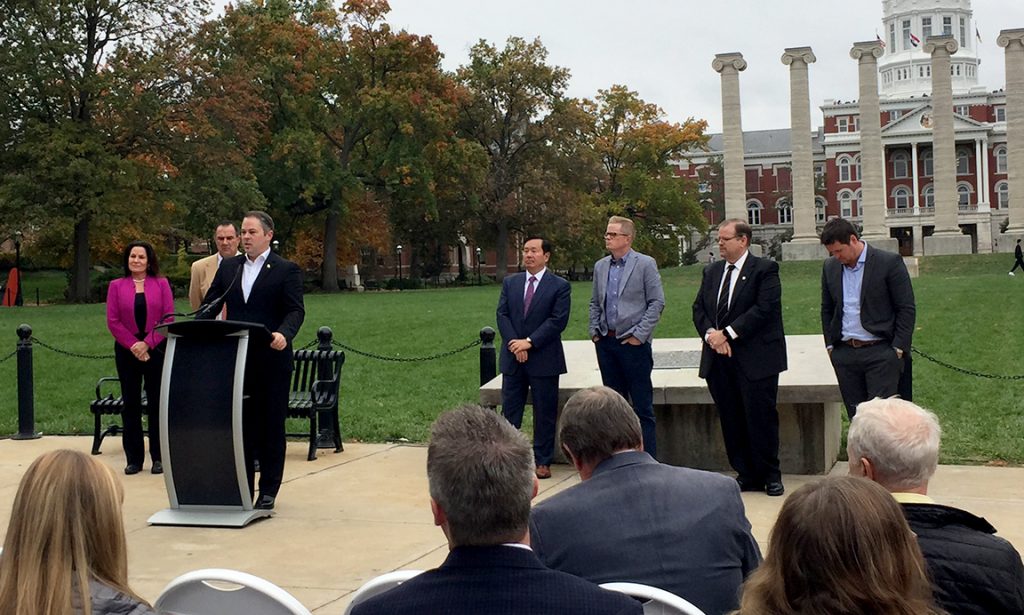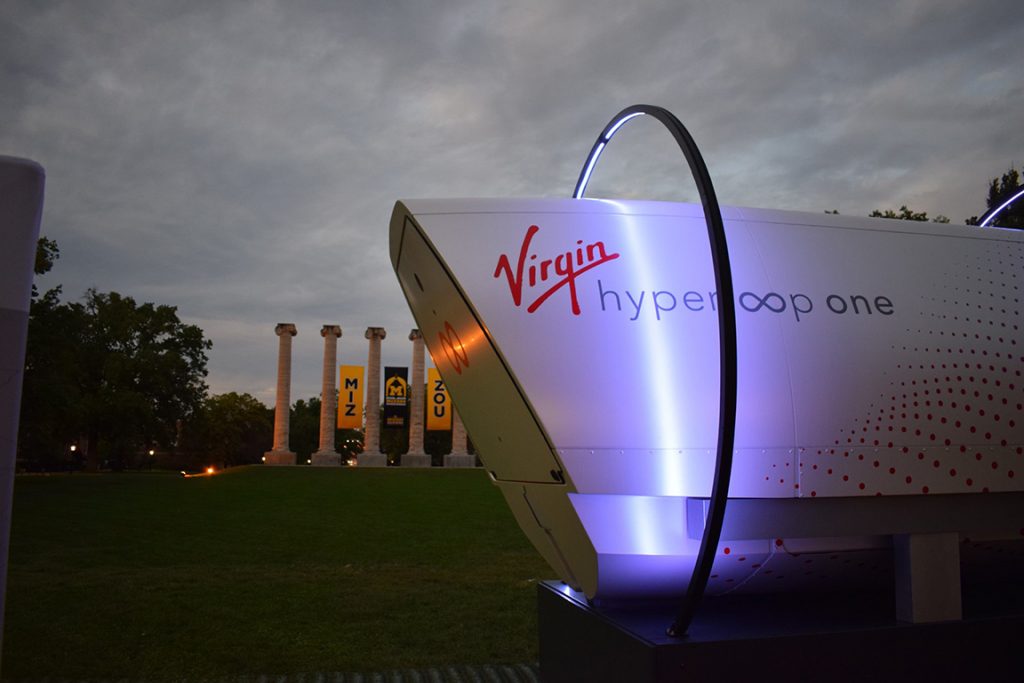October 28, 2019

Engineering Dean Elizabeth Loboa (l), Lt. Gov. Mike Kehoe, House Speaker Elijah Haahr, UM President Mun Choi, Sen. Caleb Rowden, MU Chancellor Alexander Cartwright and Treasurer Scott Fitzpatrick field questions at the Blue Ribbon Panel on Hyperloop news conference Oct. 28.
Missouri’s Special Blue Ribbon Panel on Hyperloop (BRPH) released its final report during a news conference on the Francis Quadrangle Oct. 28. Missouri House Speaker Elijah Haahr created the panel in March following a feasibility study completed by engineering firms Black & Veatch and Olsson. The panel, comprised of public and private leaders across Missouri, was tasked with providing recommendations on how to make hyperloop a reality in Missouri.
College of Engineering Dean Elizabeth Loboa, a member of the Blue Ribbon panel, served as emcee of the news conference and noted that Missouri often has led the nation in transportation innovations.
“Missouri awarded the nation’s first contract to build an Interstate Highway – what we now know as I-44,” Loboa said. “Missouri also played a key role in the early stages of the U.S. space program when St. Louis’s McDonnell Douglas Aircraft company built the Mercury space capsules for NASA. Project Mercury—the first U.S. manned space mission—began in 1958, just two years after we awarded the first interstate highway contract. And Missouri is poised once again to lead the nation in transportation.”
In the report, the BRPH notes that:
- The new economic megaregion created by linking Kansas City, Columbia, and St. Louis via hyperloop would rank among the top 10 in the United States, significantly improving Missouri’s global competitiveness for high quality jobs and talent;
- By leveraging the strengths of the University of Missouri system to convene a research and development consortium among major institutions, the state’s flagship public university would establish itself as a leader in an emerging technical field that is attractive to students, professors, grant issuers, and corporate funders; and
- Missouri manufacturers and farmers would benefit by being linked to a new mode of light cargo delivery, which would ultimately allow their products to reach external markets more quickly and efficiently.
The BRPH recommends Missouri should take steps to facilitate the construction of a National Certification Track of up to 15 miles in length. The track would serve as the natural center for research and development of the technology and should be supported by a robust ecosystem of academic and industry partners led by the University of Missouri system. Speaker Haahr noted that if the Missouri Hyperloop Project moves forward, it could be built through a public-private partnership that delivers the project in the safest, fastest and most responsible way possible, delivering the full array of project benefits while mitigating the risks to taxpayers.
According to the report, construction of the hyperloop system in Missouri would result in measurable economic, social, and educational benefits for the state:
- An estimated annual economic impact of $1.67 –$3.68 billion;
- The creation of between 7,600 and 17,200 new jobs;
- Increased real estate values around portal locations;
- A significant strengthening of key industry clusters, including automotive, chemical products, business services, tech, transportation and logistics, and aerospace;
- Increased tax revenues for state and local jurisdictions; and
- A reduction of over 530,000 metric tons of CO2 emissions.

The Virgin Hyperloop One team brought their test pod to Mizzou Oct. 3-4.
The University of Missouri’s Columbia campus is the only university in the country to receive a first-hand look at the test pod developed by Virgin Hyperloop One (VHO). The VHO team visited Mizzou on Oct. 3 and 4 and brought their test pod to the Francis Quad, where hundreds of faculty, students and staff got to see the first major new form of transportation in 100 years. In addition to giving the community a chance to see the vehicle that will travel through tubes via magnetic levitation, the College offered a Hyperloop One master class for those interested in the details of how all of this will work. Kristen Hammer, the business development manager for VHO, gave an informative presentation and fielded questions from the standing-room-only crowd in Ketcham Auditorium as well as questions from people watching the College’s Facebook live feed of the event.